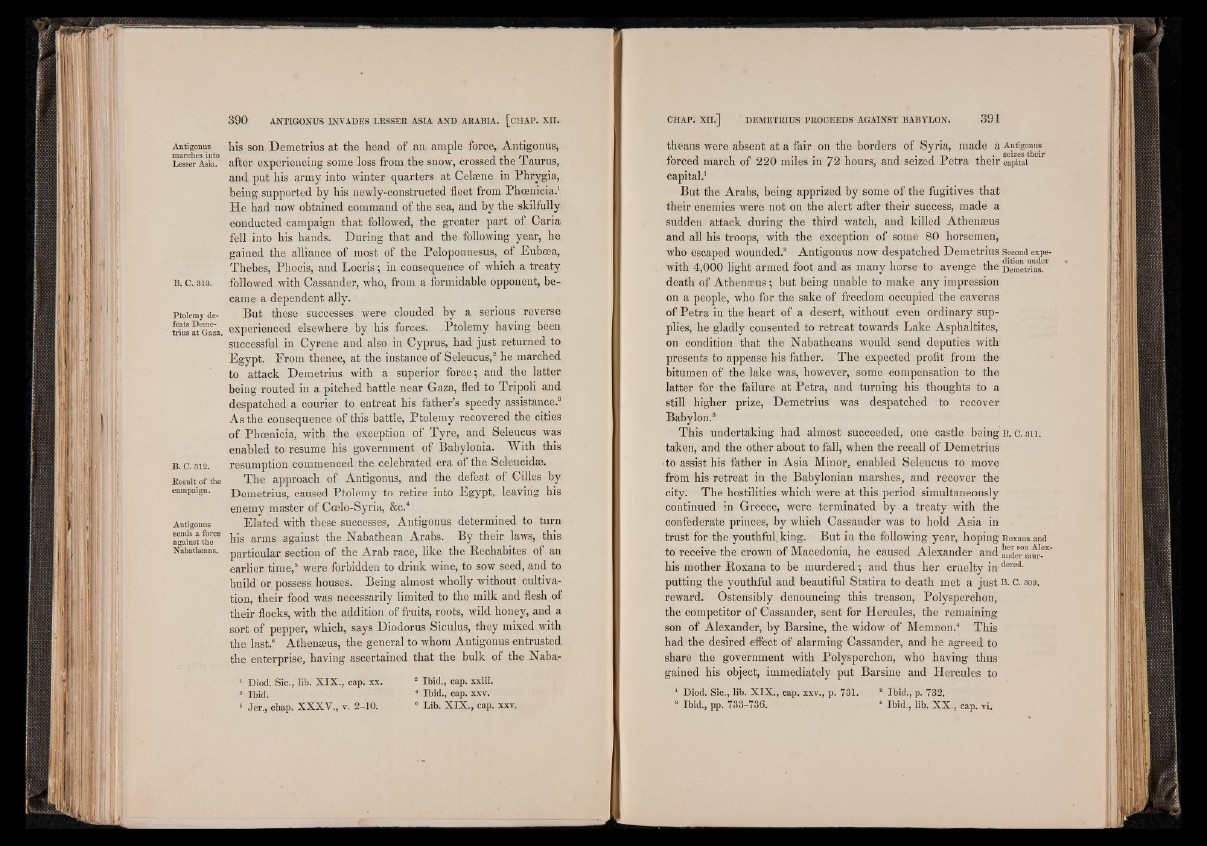
Antigonus
inarches into
Lesser Asia.
B. C. 313.
Ptolemy defeats
Demetrius
at Gaza.
B. C. 312.
Result of the
campaign.
Antigonus
sends a force
against the
Nabatheans.
his son Demetrius at the head of an. ample force, Antigonus,
after experiencing some loss from the snow, crossed the Taurus,
and put his army into winter quarters at Celaene in Phrygia,
being supported by his newly-constructed fleet from Phoenicia.1
He had now obtained command of the sea, and by the skilfully
conducted campaign that followed, the greater part of Caria
fell into his hands. During that and the following year, he
gained the alliance of most of the Peloponnesus, of Euboea,
Thebes, Phocis, and Locris; in consequence of which a treaty
followed with Cassander, who, from a formidable opponent, became
a dependent ally.
But these successes were clouded by a serious reverse
experienced elsewhere by his forces. Ptolemy having been
successful in Cyrene and also in Cyprus, had just returned to
Egypt. From thence, at the instance of Seleucus,8 he marched
to attack Demetrius with a superior force; and the latter
being routed in a pitched battle near Gaza, fled to Tripoli and
despatched a courier to entreat his father’s speedy assistance.3
As the consequence of this battle, Ptolemy recovered the cities
of Phoenicia, with the exception of Tyre, and Seleucus was
enabled to resume his government of Babylonia. With this
resumption commenced the celebrated era of the Seleucidse.
The approach of Antigonus, and the defeat of Cilles by
Demetrius, caused Ptolemy to retire into Egypt, leaving his
enemy master of Ccelo-Syria, &c.4
Elated with these successes, Antigonus determined to turn
his arms against the Nabathean Arabs. By their laws, this
particular section of the Arab race, like the Rechabites of an
earlier time,5 were forbidden to drink wine, to sow seed, and to
build or possess houses. Being almost wholly without cultivation,
their food was necessarily limited to the milk and flesh of
their flocks, with the addition of fruits, roots, wild honey, and a
sort of pepper, which, says Diodorus Siculus, they mixed with
the last.6 Athenseus, the general to whom Antigonus entrusted
the enterprise, having ascertained that the bulk of the Naba-
1 Diod. Sic., lib. X IX ., cap. xx. 2 Ibid., cap. xxiii.
a Ibid. 4 Ibid., cap. xxv.
5 Jer., chap. X X X V ., v. 2-10. 8 L ib. X IX ., cap. xxv.
theans were absent at a fair on the borders of Syria, made a Antigonus
forced march of 220 miles in 72 hours, and seized Petra their capital
capital.1
But the Arabs, being apprized by some of the fugitives that
their enemies were not on the alert after their success, made a
sudden attack during the third watch, and killed Athenseus
and all his troops, with the exception of some 80 horsemen,
who escaped wounded.2 Antigonus now despatched Demetrius Second expe-
with 4,000 light armed foot and as many horse to avenge the Demetrius,
death of Athenseus; but being unable to make any impression
on a people, who for the sake of freedom occupied the caverns
of Petra in the heart of a desert, without even ordinary supplies,
he gladly consented to retreat towards Lake Asphaltites,
on condition that the Nabatheans would send deputies with
presents to appease his father. The expected profit from the
bitumen of the lake was, however, some compensation to the
latter for the failure at Petra, and turning his thoughts to a
still higher prize, Demetrius was despatched to recover
Babylon.3
This undertaking had almost succeeded, one castle being b . c. 3 1 1 .
taken, and the other about to fall, when the recall of Demetrius
>to assist his father in Asia Minor, enabled Seleucus to move
from his retreat in the Babylonian marshes, and recover the
city. The hostilities which were at this period simultaneously
continued in Greece, were terminated by a treaty with the
confederate princes, by which Cassander was to hold Asia in
trust for the youthful,king. But in the following year, hoping Roxana and
to receive the crown of Macedonia, he caused Alexander and ander°mur-X"
his mother Roxana to be murdered; and thus her cruelty in dered-
putting the youthful and beautiful Statira to death met a just B. c. 309.
reward. Ostensibly denouncing this treason, Polysperchon,
the competitor of Cassander, sent for Hercules, the remaining
son of Alexander, by Barsine, the widow of Memnon.4 This
had the desired effect of alarming Cassander, and he agreed to
share the government with Polysperchon, who having thus
gained his object, immediately put Barsine and Hercules to
1 Diod. Sic., lib. X IX ., cap. xxv., p. 731. 2 Ibid., p. 732.
8 Ibid., pp. 733-736. 4 Ibid., lib. X X ., cap. vi.